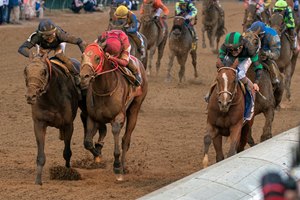A Call for Improved Transparency of Stewards' Decisions


Meeting some three months after Kentucky stewards failed to even flash an inquiry sign following a Kentucky Derby (G1) that saw runner-up Sierra Leone edge Forever Young by just a nose after repeated bumping through the stretch, members of a panel meeting in Saratoga Springs, N.Y., advocated for a much more open process in stewards' decisions on interference during the race.
During the discussion titled "Bettor (Better) Protection and Confidence" during the Racing and Gaming Conference at Saratoga, panel member Pat Cummings reminded everyone of what is at stake on such calls. Cummings, the executive director of the National Thoroughbred Alliance and a longtime advocate for horseplayers, believes the integrity of the sport suffered as this year's Derby went official with no explanation of the stewards' decision not to change the order of finish as there was a $500,000 difference between second and third and millions of wagering dollars on the line.
The most basic communication for the stewards to inform the public that they're looking further at an incident is flashing the inquiry sign. That didn't occur.
"If you can't do it on the biggest stage, how do we know you're doing it on the smallest?" Cummings said.
Beyond properly meeting the standards currently in place, Cummings would like to see the stewards supply detailed explanations of their decisions to demote horses or leave them in place after incidents are reviewed. Cummings would like to see stewards announce their decisions to on-track bettors and to simulcast players through audio or video.
Panel member Kim Kelly, chairman of the International Federation of Horseracing Authorities' Committee for the Harmonization of Racing Rules and former chief stipendiary steward for the Hong Kong Jockey Club, said Hong Kong has benefitted from going so far as to show video to the public of the stewards making such decisions.
He recalled an incident in Hong Kong when the gates didn't open evenly for all runners and the stewards there held a press conference available to the public to explain their decision to call that event a non-contest and refund all wagers. He showed video of a stewards' decision in Australia after an objection on interference in which they questioned participants, made their decision, and explained their decision—all available in real time to anyone at the track or watching a simulcast of the race.
"I think the only people that don't like transparency are the ones that have got something to fear from it," Kelly said. "If transparency is your friend, then information and provision of information is key. It's absolutely critical for the confidence of the industry and the public. ... Bettors need confidence. They won't reinvest if they haven't got that confidence.
"Even if they don't agree with the decision, they can see that everything was done by the book—fair, impartial, and objective."
Kelly also noted that when stewards explain their decisions in real time, it offers a chance to control the narrative and get ahead of misinformation.
New York steward Victor Escobar, who previously worked in New Mexico and Oklahoma, said he could see stewards' decisions being covered by video as they're made in the near future. He said such an approach could help people better understand racing and maintain confidence in the integrity of the sport.
"We all hear it, especially in the stewards' room. There's a cry and desire for consistency," Escobar said. "In terms of consistency, no two incidents happen exactly alike—there's never going to be consistency in that. But what we have to show is that there is consistent application of the rules. The only way to show them that is to provide understanding of the adjudication process."
Escobar noted that while officials in some sports can make major calls, racing stewards make calls that determine the winner or the loser, or a change in other placings. Because of the weight of those decisions, he said participants and bettors need to have confidence in the process.
Cummings believes increased transparency would help improve the consistency of rulings in racing.
"By asking stewards to explain their decisions in some sort of public forum is a way to ensure consistency," Cummings said. "If you have to defend that decision through transparent communication, it's probably going to make you think about how you're making those decisions."
